Peter MALONE
Saturday, 18 September 2021 19:33
Mom for Christmas, A
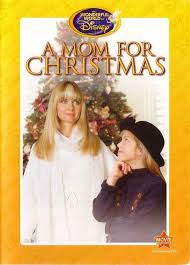
A MOM FOR CHRISTMAS
US, 1990, 88 minutes, Colour.
Olivia Newton John, Doug Sheehan.
Directed by George Miller.
A Mom for Christmas is a sweetness and light Christmas story for mothers and daughters. It was produced for the Disney company and takes its tone from the genial Disney style. The film was directed by Australian George Miller (Man From Snowy River, Bushfire Moon, Over the Hill, Gross Misconduct). The star is Olivia Newton- John (with her Australian accent) and she also sings some songs composed by her usual composer, John Farrer.
The film borrows some of its theme from the mannequin story, mannequins coming alive, this time as answers to wishes in a department store, especially for children. Jessica, the heroine, goes to the store to watch people buying, to watch mothers and daughters, and longs for a mother. Her widowed father tends to neglect her. Olivia Newton-John? is Amy, a mannequin come to life. The film has strong family themes - but everything is done in sweetness and light, especially with Olivia Newton-John's more wholesome than wholesome style.
1.Christmas story for families? For mothers and for daughters?
2.The Christmas setting, the city, the department store, homes, school, school pageants? The special effects for the statues coming alive? The songs and the musical score?
3.The title, Jessica's longing, Amy fulfilling the longings?
4.Jessica, her age, clashing with fellow students? Their taunting her? Her relationship with her father, his being busy with his work? Her dead mother? The photos - and none of her since her mother died? Going to the department store, watching the mothers and children and their buying? The wishing well, the friendship with Philomena? The promise of the fulfilment of the wish? Her looking at the statue of Amy? Amy's arrival, Jessica's response, wanting her to stay? Amy and her sweetness and light - and Jessica's reaction? Her being upset when Amy invited the boy to the house, had read her diary? Discovering that Amy didn't understand human feelings and love? Going to the shop with Amy? Training for the pageant? The other statues coming alive - Santa Claus, the gnomes, the chauffeur driving them? Going back to the shop? The encounters with the shop detective? Pleading that Amy could stay? Her relationship with her father, the bond with him growing? Hoping for Amy to stay, going to the shop, and Amy coming back? A happy future for Jessica and for her father? Wishes coming true?
5.Olivia Newton-John? as Amy, the statue, her explanation of her background, no past, talking to Jim, falling in love with him, caring for Amy, trying to do the right thing, hurt, reading the diary? Her going for her job interview, working at the shop? The pageant and its success? Bringing the other statues alive? Her having to go back, the possibility of her staying? Christmas Eve, her materialising? The happy ending?
6.Philomena, in the shop, the wishing well, making the wishes come true, her support of Jessica?
7.Jim, the death of his wife, being busy, not noticing his daughter, no photographs? The scenes between father and daughter? Accepting Amy, transforming the house? The pageant? His inviting Amy to come for the holiday? The happy future?
8.The children and their being hurtful to Jessica? The friendly girl? Preparing for the pageant? Jessica and her lapse of memory, Santa Claus giving her the cue?
9.The chauffeur, Santa Claus, the gnomes? The contrast with the store detective and his wanting to catch Amy and Jessica?
10.A happy kind of Christmas story - for families?
Published in Movie Reviews
Published in
Movie Reviews
Tagged under
Saturday, 18 September 2021 19:33
Mixed Blood
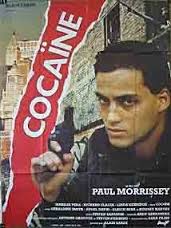
MIXED BLOOD
US, 1984, 98 minutes, Colour.
Marilia Pera, Richard Ulacia, Linda Kerridge.
Directed by Paul Morrissey.
Mixed Blood (Cocaine) was written and directed by Paul Morrissey. Morrissey was Andy Warhol's assistant director on many of his experimental films. He then went to direct his own including Flesh, Trash as well as Flesh for Frankenstein and the spoof Hound of the Baskervilles. In the '80s he made Mixed Blood, 40 Deuces and Spike of Bensonhurst, focusing on the seamier aspects of life in New York City.
Mixed Blood is an exploitation film, focusing on rival gangs in Alphabet City in Lower Manhattan. One is presided over by a Brazilian matriarch, a type of contemporary Bloody Mama. The viciousness of the gangs is presented, the ugliness of the drug scene - which nevertheless entices women from uptown to flirt with Hispanic drug dealers. Former police, European drug dealers are also portrayed.
The film acts as a kind of docudrama with the heightened exploitation style.
1.The work of Paul Morrissey, his background with Andy Warhol? Experimental observation of human behaviour? The attraction towards the seamier side of life? A picture of Alphabet City, exploitive, voyeuristic?
2.The semi-professional cast, their authentic appearance and style, impact? The crass aspects of life in Alphabet City, behaviour, language and violence?
3.New York City, the lower east side, Alphabet City and its streets, houses, slums, supermarket drug-dealing? The musical score?
4.The title and its focus? For what audience was the film made? New York, American, international? Why?
5.The quality of observation, docudrama style and detail?
6.The conventional plot, the controlling matriarch, the rival gangs, her influence on their lives, their relationship to her, amongst themselves? Jealousies? Former police, European drug dealers? The society girl attracted by the low life? The violent intrigues and deaths?
7.A portrait of an ugly world, violence and drugs, men and women, relationships?
8.Rita and her presence in New York City, speaking Spanish? The mother and the variety of her children? The attachment to Thiago? The kids and the drugs, her power, money, dealing? Her life and jealousies? The German drug dealer, intrigues? Carol, Rita's reaction? The hiring of Comanche, the killer? The deals, the kidnapping? The stabbing and her gloating? Her observing the deaths? The evil mother? Thiago's return to her?
9.Thiago, caught up in this way of life, his relationship with Rita, the hero of the film? At work, with Juan, the fights between the gangs, the police? The attraction to Carol, the possibility of change, the plan for the trip to Rio? The kidnapping and his being goaded into action? Deaths and his disillusionment? Return to his mother?
10.The two gangs, the Puerto Rican background, the Brazilian background? The young boys - too young to go to prison if arrested? The German observing from his car? The dances and the murder from the rooftops? The fight between Thiago and Juan? The wounds and injuries? The racial components of Alphabet City: Chinese, Hispanics, blacks? The plan for gang warfare? The plots against Rita? The confrontations, Comanche, the avenging of shootings? Juan and his leadership, death?
11.The German, his wealth? Observations, plans?
12.Carol, her relationship to the German, the attraction towards the low life, meeting Thiago, with him, the plea to leave, the abduction and her death?
13.Commanche, his motives, the abduction, the trap and murder?
14.Hector, the former police, the cops, Operation Cleanup? The helplessness of the police?
15.The range of characters, lifestyles? The outside audience evaluating the characters, the way of life, behaviour - with voyeuristic touches?
Published in Movie Reviews
Published in
Movie Reviews
Tagged under
Saturday, 18 September 2021 19:33
Misty
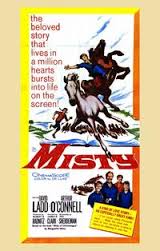
MISTY
US, 1961, 92 minutes, Colour.
David Ladd, Arthur O'Connell, Pam Smith.
Directed by James B. Clark.
Misty is a pleasing family film, about ponies off the Virginia coast. It stars David Ladd, who appeared in The Proud Rebel and A Dog of Flanders. Anne Seymour and Arthur O'Connell are genial grandparents.
The film focuses on a young boy and a girl, their living with their grandparents, working and school, getting a sense of responsibility, their ambitions to buy a pony and their doing odd jobs to raise the money. Naturally, after some difficulties, there is a happy ending. The film was made in Cinemascope and colour and uses the Virginia coast locations very well indeed, especially the round-up of the ponies and their swimming to the mainland. The film was produced by Robert Radnitz, who specialised in this kind of family film during the '60s (My Side of the Mountain) and was directed by his regular director James B. Clark.
1.Entertaining family film? Families, children? Animals?
2.Cinemascope and colour photography, the Virginia coast? The town? Authentic atmosphere? Musical score?
3.The title and the focus on the young pony, Paul and Maureen and their working for the ponies?
4.Paul and Maureen, their age, relationship? With their grandparents? Their absent parents? Walking along the beach, talking? The ponies and their longing to have one? At home, learning responsibility, doing their jobs? Their love for their grandparents? The odd jobs, working hard and collecting the money, their secret? The reputation of grandfather in the town, their learning by their mistakes? The request? Gentling the ponies, going on the round-up, the chase, getting the Phantom, wanting Misty the foal? The fair and the races? Their hoping to buy the pony, its being bought already? The auctioneer and his kindness, getting the pony and the foal for Paul and Maureen? Their looking after them? Raising Misty, letting the Phantom go back to the wild ponies? The portrait of the children, characters well-drawn, sympathetic?
5.Clarence as a genial grandfather, his relationship with his wife, their care of the children? Kindly, training them? Their jobs? Paul lost on the island and having to be rescued? Strong with discipline but kindly? Allowing the children to train the ponies? Grandfather worried about people giving him credit, having to confront the children? The round-up, the happy ending?
6.The world of the ponies, the background story of the Spanish galleons, the round-ups? The in-breeding? But the buying of the ponies, training them? The children loving them? The pony seller and his kindness?
7.A pleasing portrait of children, of family, of love for animals, of growing up well? A piece of Americana - for all audiences?
Published in Movie Reviews
Published in
Movie Reviews
Tagged under
Saturday, 18 September 2021 19:33
Miss Right
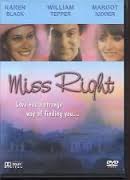
MISS RIGHT
US, 1981, 98 minutes, Colour.
William Tepper, Margot Kidder, Karen Black, Virna Lisi, Marie France Pisier.
Directed by Paul Williams.
Miss Right was written by actor William Tepper, who plays the central role. He co-authored the story, along with director Paul Williams.
The film has a Roman setting with attractive scenery and locations. However, by focusing on William Tepper's Terry, we see a self-preoccupied male chauvinist, fantasising about his own sexual attractiveness, fantasising about the main women in his life. He invites each of them to a meal, makes a cake for them, intends never to see them again so that he can have his freedom and Miss Right. Feminists would be immediately up in arms at his attitudes, let alone the sequences in which distinguished actresses encounter him and seem to find him so attractive that they will be prepared to destroy their lives for his sake. The actresses are Marie-France? Pisier, Virna Lisi and Karen Black. Margot Kidder eventually arrives as Miss Right - there may be some comeuppance for him at various times, but the film is dominantly chauvinist.
1.Interesting and entertaining drama? The story of a man and his sexual relationships? The role of the women in his life?
2.Roman settings, exteriors, interiors, workplaces - and echoes of the Red Brigade? The musical score?
3.The title, Miss Right for Terry and his criteria for judging her?
4.Terry himself, the introduction, his talking to himself, the credits and his proposals to the various women, attraction, rejection? His work? His neighbour - and his bringing his fiancee to see Terry? Amy ousting them? His co-worker and his description of what he should do? His feeling lost?
5.The visit of B.B. - and his memories of meeting her on the job, modelling the clothes, the sexual encounter? Her visit, her relationship with the other woman? Trying on the dress, conversation with Terry, his wanting to end the relationship? Her skill in cooking? Her cake? His treatment of her, her subservience to his emotional domination? Her leaving?
6.Anna, the older woman, leaving her husband? The memories of their relationship? The young man, flattering the older woman? Her subservience to him? The meal, the conversation, the separation, his wanting to be free? Her putting the pasta all over him? Taking him out to meet her husband? His rejection?
7.Amy, the memories of the first encounter, her wanting to write a novel, imagining the relationship and its consequences? Her visit, her love for him, dependence on him, his chauvinistic treatment of her - putting her outside the door, dragging her in the chair? Her relentlessly wanting to stay with him?
8.Seeing Miss Right in the street - and imagining his chasing her, talking with her, the mutual attraction? The encounter, her going home, talking with him, telling her story, his listening? The note? His desperation, elation? Going to the studio - and her posing rather than being an artist? Any future?
9.Romance, battle of the sexes, equality of the sexes, the male perspective on women? The male's comeuppance?
Published in Movie Reviews
Published in
Movie Reviews
Tagged under
Saturday, 18 September 2021 19:33
Mission to Mars
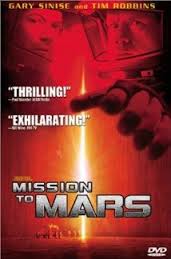
MISSION TO MARS
US, 2000, 115 minutes, Colour.
Gary Sinise, Tim Robbins, Don Cheadle, Connie Nielson, Jerry O' Connell, Armin Mueller- Stuhl.
Directed by Brian de Palma.
An expedition to Mars investigates a mysterious mountain, Cydonia, which comes alive and destroys all the members of the team except Luke Graham. Mission Control has to decide whether to send a rescue team.
Woody Blake is in charge of the new mission, working with his wife, Terri. He insists that Jim Mc Connell be co-pilot. It was Mc Connell with his wife (who died from cancer) who had pioneered the project. When they reach Mars, their vehicle is wrecked by meteorites and Woody, trying to connect with a module, drifts away and dies.
They discover Luke in his greenhouse and try to interpret the data from the mountain. They realise that the code is for DNA structure - and the mountain opens, offering air and a hologram of the solar system which reveals that after a meteor explosion the Martians went to another part of the universe although some went to earth and illustrates the process of evolution. When the group decide to go back to earth, Jim (still grieving for his wife) opts to accept the Martian invitation to go with them to a better, more peaceful world.
Mission to Mars had a very mixed reception, critics damning it for being derivative and silly while the Cannes Film Festival invited the film and De Palma for principal screenings.
While it is reminiscent of so many science fantasies for 2001: a Space Odyssey to Contact and The Abyss, as well as action adventures like Total Recall, it is a straightforward story of a failed expedition, a rescue mission and a revelation, which is very positive rather than destructive, about earth and about peaceful intelligence in the universe.
While director Brian de Palma used to make Hitchcock-like thrillers, in the 90s he moved to action adventure, especially the first Mission:Impossible movie. In fact, the heroics in Mission to Mars seem more like those of The Right Stuff and the teams combating meteors in Deep Impact and Armageddon.
Gary Sinise starred in Apollo 13 so is able to sustain the heroic role of the astronaut with integrity but also with vision. Tim Robbins leads the rest of the cast although he drifts into space and dies half way through.
In view of unsuccessful Mars probes in 1999-2000, the film takes a patriotic stance in favour of further exploration - as well as offering a visionary interpretation of intelligence in the universe.
1.Space exploration? The tradition of The Right Stuff? The tradition of explorations like Contact? The background of disaster films on Mars, Total Recall? The various influences on this action adventure in space?
2.The Earth sequences, anchoring the audience in the real world? The training stations, the Mission Control and the experiments for going into space? The space sequences, Mars and its surface, the mountain, the special effects for its destructiveness? The special effects for its interior? The final journey?
3.The patriotism of the film? The Americans and the exploration of the universe? The American flag? The musical score, songs?
4.The opening with Earth: the Fourth of July picnic, the introduction to Luke and his family, to Jim and his grief about his dead wife, Maggie? The introduction to Woody and Terri? Their good friendship? The reality of the mission - Jim not being in charge, Luke taking his place?
5.The transition to the mission? Luke and his abilities, the voyage to Mars, the year? The landing? Setting up, the exploration, the confrontation with the mountain? The mountain and the human face - the challenge of intelligence and mystery? The opening up of the face - and the special effects and their overwhelming destructiveness? The deaths of the crew? Luke and his survival?
6.Ray Beck and his decisions about another mission and rescue? Mission Control and its setup? Woody and the discussions, influence on the decisions? His going, Terri going with him? His decision to ask Jim and Jim's background knowledge? The insertion of the videos to give an impression of Jim and his relationship with Maggie? Their love? Their work and collaboration? Phil being a member of the team? The journey to Mars and the optimism? Life on the ship - gravity, the dancing and singing?
7.The meteorites and the destruction of the vessel? Decisions being made - for Terri, for Woody? His opting to go out, missing the link? Being stranded? The bond between husband and wife, the grief? The decisions - his removing his mask?
8.The landing on Mars, the mystery? The sudden confrontation with Luke? His surviving - his greenhouse? The mystery of his capacity to survive? The air? The plants? The confrontation with the mountain?
9.The team and their working on interpreting the codes from the mountain? The various possibilities, music (and Close Encounters of the Third Kind)? The realisation that it was DNA?
10.Confronting the mountain, going in? The vastness and the beauty? The hologram and the presentation of the universe? The history of the Martians? The visual presentation of the development of evolution? The destruction of Mars, their going to outer galaxies? Those who went to Earth?
11.The repercussions for leaving Mars? Phil and the vehicle, the split-second timing? Luke and Terri and their decision to go? Jim and his decision to stay?
12.Jim and his options, the hopes for a better universe, being reunited with Maggie? The departure of Jim as a kind of ascension into another world, another universe? The return to Earth?
13.The significance of the mission to Mars in terms of exploration, in terms of vision for the future and intelligent life in the universe?
Published in Movie Reviews
Published in
Movie Reviews
Tagged under
Saturday, 18 September 2021 19:33
Mischief
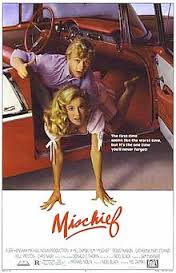
MISCHIEF
US, 1985, 93 minutes, Colour.
Doug Mc Keon, Catherine Mary Stewart, Kelly Preston.
Directed by Mel Damski.
Mischief is a pleasant film, set in the mid-'50s in a small American town. It is once again about youth, a theme so popular in films of the period. However, there is a strength in the characterisations as well as in the writing. The screenplay is by Noel Black, author and director of many films of the '60s and '70s including Pretty Poison, Jennifer On My Mind. Direction is by Mel Damski, a director of a great range of telemovies. The film has Doug Mc Keon (On Golden Pond) as the star and he sustains the film. Chris Nash is good as his rebellious friend. The other stars emerged into careers in the mid and late '80s, including Catherine Mary Stewart, Kelly Preston, Jamie Gertz (in a brief role) and Terry O'Quinn as Gene's father, who emerged as a star in The Stepfather.
1.The picture of youth, the past, comparisons with the '80s? The ironic touch with the opening in and the reference to the galaxy of the past?
2.The picture of Nelsonville, its environs, the school, cinema, the streets? Bike and car action? The musical score, songs of the period? The echoes of the films of the period - Rebel Without A Cause, Love Me Tender?
3.The title and its tone? References?
4.Jonathan as a young man of the mid-'50s, nice, clean-cut, his home, father as a dentist? His crush on Marilyn - and the crashing of the car? His friends, at school, ambitions for college? His friendship with Gene, meeting him, talking and sharing, going to his room, understanding him? Discussions, sharing ideas, opening his mind? Strategies for dates with Marilyn? The date, his friendship with Bunny? Awkwardness with Marilyn, the drive-in, in the car, the sex, going to bed in Marilyn's room, escaping and encountering her mother? Gene and his problems? Kenny and the cars? Their roughing him up at school? Gene's going, Bunny and the elopement, his giving the message to her father? Meeting the waitress, being ditched by Marilyn, crashing his car into Kenny's? His future?
5.The contrast with Gene, from Chicago, ousted from school, his strict father, the bike, being grounded, work, the encounters with Kenny and the toughness, the driving of the car? Friendship with Jonathan, talking, his angers, sharing, his attraction towards Bunny, the horses? The strategies? The clash with his father? Going away, returning, eloping with Bunny? Their future?
6.Marilyn as the school beauty, at the school, with the boys, the dates, her date with Jonathan, the car, in her room, her sexual experience, dumping him?
7.The contrast with Bunny, attractive, imposed on by Ken, the dates, attracted towards Gene, their being together, the discussion about horses, the eloping?
8.Kenny and his toughness, the boys around town, pushing everybody around, spurning Jonathan, the clash with Gene, at the garage, the chicken race, the ending, Jonathan crashing his car into Kenny's?
9.The sketch of parents, their ordinariness, concern about their children, Gene's father and his strictness?
10.The flavour of the period, problems, relationships, hopes? The contrast with later decades?
Published in Movie Reviews
Published in
Movie Reviews
Tagged under
Saturday, 18 September 2021 19:33
Mirrors/ 1985
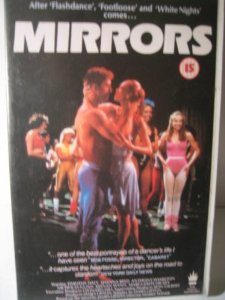
MIRRORS
US, 1985, 99 minutes, Colour.
Marguerite Hickey, Timothy Daly, Keenan Wynn, Antony Hamilton.
Directed by Harry Winer.
Mirrors is a telemovie variation on the chorus line theme. A young ballerina from Detroit is portrayed in a newspaper article - which leads to advances for herself and a relationship with the journalist. Marguerite Hickey is effective as the dancer. Timothy Daly is the journalist. The supporting cast includes Keenan Wynn as the girl's clergyman grandfather.
The film shows the difficulties of ballet school, auditions, Broadway musicals, tryouts. There are also the usual tangled relationships - including one with Antony Hamilton, the Australian model (Samson and Delilah). There is nothing particularly new in the film - but it is presented quite entertainingly.
1.Entertaining telemovie? The world of dance? The world of journalism? Broadway ambitions?
2.Detroit, New York, Philadelphia - American cities? Homes, theatres, performances? The musical score?
3.The title, the focus on the characters, their reflections?
4.Karin, the dancer, at school, the subject of the article, her response to Chris? Dancing - yet the difficulty of diabetes? Her relationship with Chris? Her grandfather and his support, his death, the legacy? The decision to go to New York? Meeting Diane and Terry, flatting, ballet school? Going to the audition for Broadway, winning a place? Terry and his depression? Chris's arrival, his puzzle about the living arrangements? The performances, meeting Gino? Gino and the rivalry with Chris? The tryout in Philadelphia, her skills, the dance especially written for herself and Gino? Rehearsals, the diabetes, with Gino and the sexual encounter? Chris's coming, the tension, performance? Her decision to go on without him?
5.Chris, the journalist, with the ballet people, the article, the advances of Karin? His resistance? The affair, coming to New York, his disappointment, puzzle about relationships and living arrangements? His turning up, concern about her? His own career? Future?
6.Diane, her friendship, relationships, auditions? Performance? Her own problems? Terry, homosexual, homosexual friends? Flamboyant? Depression? Philadelphia, the bad news? Diane and the phone call, Terry's suicide, the funeral?
7.Gino, as a dancer, relationships? Rivalry with Chris? Attracted to Karin? Their special performance, her diabetes, taking her home, the relationship?
8.The family, Grandpa, his pride in Karin, his eccentric behaviour at home, his collapse in the theatre and death?
9.The popular story about the difficulties of dancing, training? Going to the big city for education? The lucky breaks, auditions? The difficulties of performance, rehearsal? The show must go on?
Published in Movie Reviews
Published in
Movie Reviews
Tagged under
Saturday, 18 September 2021 19:33
Miranda/ 1947
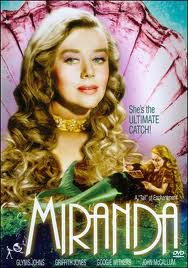
MIRANDA
UK, 1947, 80 minutes, Black and white.
Glynnis Johns, Griffith Jones, Googie Withers, Margaret Rutherford, David Tomlinson, Sonia Holm, John McCallum?
Directed by Ken Annakin.
Miranda is a pleasantly lightweight comedy from Britain of the late '40s. It was directed by Ken Annakin, establishing his career as a director of small British comedies. He was soon to work with Disney (Sword and the Rose as well as more spectacular films as The Swiss Family Robinson) and finally was to work internationally on some very big-budget films, for example, Those Magnificent Men In Their Flying Machines and The Battle of the Bulge. The film is a vehicle for Glynnis Johns as a mermaid. Margaret Rutherford appears as her nurse and the supporting cast includes Googie Withers and David Tomlinson. There was a sequel in 1954, Mad About Men, directed by Ralph Thomas and filmed in colour. Margaret Rutherford reappears, as does Glynnis Johns in a double role.
1.Popular British comedy of the post-war period? Realism and fantasy?
2.The black and white photography, the English coast, the interiors for the drama? Musical score?
3.The title and the focus on Miranda, Miranda the mermaid?
4.The plausibility of the plot? The fairytale implausibility? But its being treated in a realistic, even naturalistic way? Miranda and her life as a mermaid? The life under the sea, her swimming, eating, her appearance? The tradition of the seductive female of the sea and Miranda and her flirting with the various men in the film? Charles, Paul, Nigel? Her devices for coming on land? Paul and his helping her, her outings, the opera? The ambiguities of life in the house, being in the bath, her food? Her tantalising the men, puzzling and alienating the women? Her friendship with the nurse? Her finally going back to sea? The mermaid as femme fatale?
5.The men and their relationships, Charles and Betty, Paul and Claire, Nigel and Isobel? The tangles with Miranda, the attraction, flirtation, Paul and his trying to conceal the relationship, Charles and Nigel and their infatuations? The possibilities of engagements? The plans falling apart and Miranda going back to sea?
6.The contrast with the women, Betty as the maid, Claire and her control, Isobel and her own flirtatiousness? The relationship with the men, the antagonism towards Miranda? The resolution and their finding their men again?
7.Margaret Rutherford as the nurse - and the enjoyment of her dithering style?
8.Popular entertainment? The variation on the battle of the sexes?
Published in Movie Reviews
Published in
Movie Reviews
Tagged under
Saturday, 18 September 2021 19:33
Mine Own Executioner
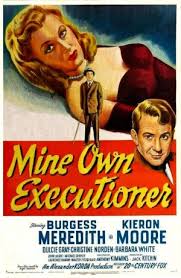
MINE OWN EXECUTIONER
UK, 1947, 108 minutes, Black and white.
Burgess Meredith, Kieron Moore, Dulcie Gray, Barbara White, Christine Norden.
Directed by Anthony Kimmins.
Mine Own Executioner comes from a quotation from the poet John Donne, focusing on the way we torment ourselves. It is the title of the novel by Nigel Balchin, who adapted the novel for his screenplay.
The film was one of the earliest about psychiatry. A solid British production and British cast, it has American Burgess Meredith in the lead. He portrays a psychiatrist, shown at work, yet with his own complexities and problems, working on hunches and unable to save one of his clients from killing his wife and suicide. Kieron Moore is effective as the troubled ex-soldier.
The film has a London setting of the period, raises questions about counselling, psychiatry and therapy. It has a good climax - both with the suicide on a ledge and the psychiatrist climbing a ladder to reach him, as well as an airing of the issues in court.
1.Effective psychological drama? Britain of the '40s?
2.The English settings, London, the '40s? The world of psychiatry, medicine? Social life? The musical score?
3.The quote from John Donne, personal torment, self-torment?
4.Burgess Meredith as Felix: his practice, with the other doctors, the need for funds? The boy and the bed-wetting? His rich clients and their problem? Mrs Lucian and her visit, concern about Adam? Adam coming to see him, the first interview, taking his case, the checking out with Dr Garsten? His relationship with Pat, the stresses at home? Socialising with Peter and Barbara, Barbara's visit and her emotional relationship with him? His sense of call?
5.Felix and his relationship with Pat, his angers, her awkwardness, the buying of the coat? Puzzling about his life with Dr Garsten? The reconciliation with Pat? Barbara, social encounters, the professional encounter? The buying of the coat? Going out with her - and Pat's desperate phone call? His relationship with his friends and doctors? Pressure for grants, supervision? His work with Adam, his style, ability to listen, to assess? Adam taking his cane and the case? Listening to the stories about his wife? About the service in Burma, the crash, being carried through the jungle? Imprisoned, tortured? A re-examination of his past? The need to go deeper, Adam's wariness? Felix's illness, letting Adam go? Dancing with Barbara, the message, going immediately home, Adam there with Pat, getting her away? The suicide attempt, climbing the ladder, pleading, reassuring Adam about his wife having no pain? Adam's killing himself? His presence in the court, his directness and telling the truth? Vindication? Wanting to give up? The boy arriving again - and his realisation of his talent and vocation? The portrait of a psychiatrist, ordinary, with his own problems, able to be sympathetic, not dogmatic?
6.Mrs Lucian and her concern, her husband's threats, the consultation, advising her not to stay in the shadow, her being seen as the Japanese sentry, her husband killing her? Adam and his manner, his caution, stealing, wanting to talk about it, the limp? Wanting to remember, not being able to? Talking about himself in the third person? The war experience, the crash, through the jungle, the imprisonment, the torture, not telling what the Japanese wanted, pouring it out, even making it up? Sense of shame? Feeling better, the gun? Killing his wife, going to Pat? His standing on the ledge, the suicide?
7.Pat, her relationship with her husband, support, feeling dull, wary, reconciliation? Jealousy of Barbara, the coat? Threatened by Adam? Final affirmation of her husband?
8.Peter and Barbara, social friends, Peter's interest in psychiatry, Barbara's consultation, flirting, with the coat, her deliberate indiscretions? The evening with Felix?
9.Dr Garsten, medical science, discussing psychiatry, warm help, support of Felix personally? His testimony in the court - and his shrewdness in getting the measure of the magistrate doctor?
10.The magistrate, the question of medicine and psychiatry, the interviews and cross-examinations, Dr Garsten's testimony?
12.The themes of psychiatry, theories and practice? In the '40s? Now?
Published in Movie Reviews
Published in
Movie Reviews
Tagged under
Saturday, 18 September 2021 19:33
Mind Games
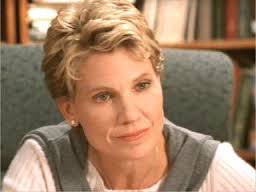
MIND GAMES
US, 1996, 90 minutes.
Lindsay Frost, Jayne Brook, Kyle Secor.
Directed by Jan Egelson.
Mind Games is a telemovie which focuses on psychological malpractice. The film focuses on a couple, he an architect, she a successful businesswoman, and their problems with their nine-year-old son. In going to a psychologist, they encounter Karen who, it eventuates, suffers from a traumatic childhood and is bent on destruction. As the film opens, we see a young man driven to his fulfilment of his death wish by her.
Karen is plausible (except that she doesn't expect that she will be found out). She sets about to destroy the family, insinuating lies and being seductive. There is a final confrontation - which ends rather briefly with her self-destruction.
The film is interesting in its dramatisation of a psychologist breaking the barriers and norms of the profession and the destructive effect.
1.Impact of the film? Telemovie for the home audience? Family, dysfunction, the disruption by the psychologist?
2.The American family, Chicago setting, the successful family? The psychologist's offices, videoing interviews? An atmosphere of affluence? The city? Musical score?
3.The title and its focus on Karen and the impact of her father's behaviour to her? Her destruction of her family? Her destruction of her clients and the mind games she played?
4.Themes of psychologists and professional ethics? Families, secrets, the potential for destruction? Dysfunctional children and therapy? The final theme of love and a united family?
5.The portrait of Karen, glamorous psychologist, the support of her staff - yet her caustic treatment of them? The opening with the young man phoning her desperately and his being run over? The later visualising of the tapes and her seduction and destruction? Her watching Doug and Hannah, insinuating herself into their case? The scene where she made them embrace? Kyle looking at her? Her forcing Hannah to tell her secret? Seduction of Doug? Her telling lies to Luke? Her being plausible with each of the family members, with the staff? The confrontation with her sister, the story of the truth, her wanting to take Amy, the crash and her death?
6.The focus on Hannah and Doug? Hannah and her success, the overseas shops, staff, the videos? Doug and his being an architect, the failure of his company and the aftermath? The bond between the two, their concern about Luke? Love for Amy? Their going to the psychologist? Karen's criticism of Hannah's lack of interest and blaming her? Their response, their concern? Hannah being forced to tell Doug about the affair and the aftermath? Doug and his hugging Hannah, the dinner, his not wanting to continue, the phone call to Karen, the seduction - and his punishing Hannah? The disruption, Hannah's return home, the truth? Karen telling Hannah that Doug was sexually abusing Amy? Her trying to make an official complaint, the support of the staff? Her visit to Karen's apartment, seeing the video? Getting the children away, the reconciliation? Karen taking Amy and their saving her life? The aftermath, the family together, a future?
7.Luke, his problems, sensing his parents' secrets? The cigarette lighter, burning the house? The reaction to Karen's confidences, his expecting his parents to divorce? Amy, overhearing the talk between her parents? Being present when Luke lit the fire? The aftermath and the therapy?
8.The staff and their support of Hannah, the success of the company, shops, international development?
9.The staff at the clinic, the doctor and his support of Karen?
10.The plausibility of the plot? Heightened for dramatic effect? The critique of psychologists and their need for responsibility? The family themes?
Published in Movie Reviews
Published in
Movie Reviews
Tagged under